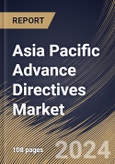Bioethical principles, including autonomy, beneficence, and non-maleficence, are foundational to medicine. Advanced directives align with these principles by giving individuals the autonomy to make decisions about their healthcare while guiding healthcare providers in delivering care that is in the patient's best interest. Pressures on healthcare systems, including resource constraints and the need for efficient allocation of medical resources, have prompted a focus on patient-directed care. Advanced directives contribute to streamlining medical decision-making processes, helping healthcare providers allocate resources per patients' documented preferences.
The most traditional application of advanced directives is in end-of-life care. Individuals use these documents to express their preferences regarding life-sustaining treatments, palliative care, and decisions about organ donation. Advanced directives are a compass for healthcare providers and family members when navigating complex decisions in emotionally charged situations. Beyond end-of-life scenarios, advanced directives are increasingly relevant in chronic and debilitating conditions. Individuals facing conditions such as advanced dementia, neurodegenerative diseases, or severe disabilities utilize these directives to guide medical decisions throughout their illnesses.
The evolution of healthcare systems in the region, focusing on patient-centered care, has contributed to an increased awareness of advanced care planning. Healthcare providers are recognizing the importance of discussing end-of-life preferences with patients. Due to the aforementioned factors the market growth will drive in this region.
The China market dominated the Asia Pacific Advance Directives Market, By Country in 2022, and would continue to be a dominant market till 2030; thereby, achieving a market value of $20,630.7 Million by 2030. The Japan market is registering a CAGR of 16.8% during (2023 - 2030). Additionally, The India market would experience a CAGR of 18.3% during (2023 - 2030).
Based on Component, the market is segmented into Services and Software. Based on End User, the market is segmented into B2B (Healthcare Providers and Payers) and B2C. Based on Demographics, the market is segmented into Elderly Population (65 yrs & above), Middle Aged (40-64 yrs), and Young Adults (18-39 yrs). Based on countries, the market is segmented into China, Japan, India, South Korea, Singapore, Malaysia, and Rest of Asia Pacific.
The market research report covers the analysis of key stakeholders of the market. Key companies profiled in the report include ADVault, Inc., VynaCare, WiserCare Inc., Sharp Healthcare, Affirm Health Inc., Thanacare, Honor My Decision LLC, Koda Health, ThoroughCare, Inc., Vital Decisions LLC (Evolent Health LLC).
Scope of the Study
Market Segments Covered in the Report:
By Component- Services
- Software
- B2B- Healthcare Providers
- Payers
- B2C
- Elderly Population (65 yrs & above)
- Middle Aged (40-64 yrs)
- Young Adults (18-39 yrs)
- China
- Japan
- India
- South Korea
- Singapore
- Malaysia
- Rest of Asia Pacific
Key Market Players
List of Companies Profiled in the Report:
- ADVault, Inc.
- VynaCare
- WiserCare Inc.
- Sharp Healthcare
- Affirm Health Inc.
- Thanacare
- Honor My Decision LLC
- Koda Health
- ThoroughCare, Inc.
- Vital Decisions LLC (Evolent Health LLC)
Unique Offerings
- Exhaustive coverage
- The highest number of Market tables and figures
- Subscription-based model available
- Guaranteed best price
- Assured post sales research support with 10% customization free
Table of Contents
Companies Mentioned
- ADVault, Inc.
- VynaCare
- WiserCare Inc.
- Sharp Healthcare
- Affirm Health Inc.
- Thanacare
- Honor My Decision LLC
- Koda Health
- ThoroughCare, Inc.
- Vital Decisions LLC (Evolent Health LLC)








